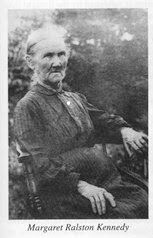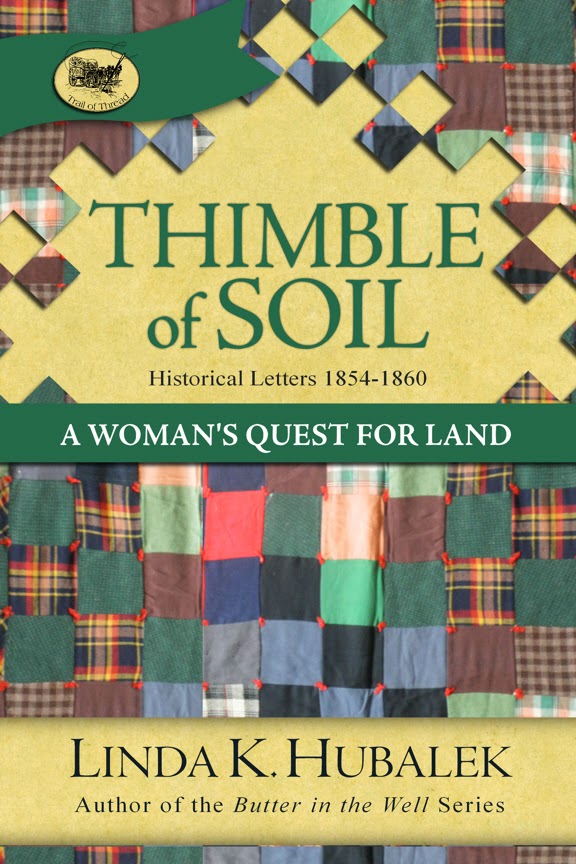The next generation moved to Ohio, with a short stop in Illinois before the family was enticed by the 1854 opening of the new Territory of Kansas. They seemed to always look for expansion of land due to their expanding family.
I featured Margaret Ralston Kennedy in Thimble of Soil. She came with eight of her thirteen children–as a widow–to settle them all together in the new territory in 1855.
According to records I found in the Watkins Museum in Lawrence, KS, most of the family made the trip by a wagon train. They stopped in Kansas City to meet up with family that made the trip by boat with a year’s worth of supplies and farm equipment. This following newspaper story gave me the idea and outline for my ancestor's story.
Here's an excerpt from the Kennedy Reunion, June 1895, The Jeffersonian Gazette, Lawrence, Kansas.
Forty years ago last Friday night a party of travelers camped at Hickory Point a few miles north of what is now Baldwin. The company had left Illinois one month previous in search of homes for themselves and children. They traveled in large covered wagons each drawn by four yoke of oxen.
Traveling northward next morning, at the bow of the hill the beautiful valley of the Wakarusa burst upon their view, with its wide sweep of prairie land covered with luxuriant grass and flowers of every hue, and bordered and fringed by forest on the hill-sides and the banks of the creek.
The travelers with one accord decided that this should be their future home and at nightfall they were encamped on the banks of this stream a few rods above where we are now.
Here they lived for the first two weeks in their wagons and tents, before settling on their different claims. The majority of this company, twenty-three in number, belonged to the Kennedy family. The survivors of that company with their families have met here today to celebrate the fortieth anniversary of their arrival.
As you talk of old times today, and look in each other's faces, you will not see the wrinkles with which toil and care have furrowed faces, nor the silver thread which father Time has given you, but rather you will remember each other as you were then-strong, stalwart men in the first flush of manhood, and rosy cheeked happy young mothers-scarcely realizing the hardships that lay before you, yet pluckily determined to overcome then, whatever they might be.
The joyfulness of this reunion is saddened by the thought that all of the original number is not present. A mother, three sons and a daughter have fallen asleep but the memory of them lives-will ever remain with us. . . .
Mrs. Margaret Kennedy, the mother of the Kennedy family though somewhat advanced in years, came to this new country with her children and by her fortitude and courage which were always characteristic of her, sustained them when the days of trouble came. It has been said of her that she was never known to speak an unkind word of any one. As a wife, mother and Christian, she fulfilled the highest ideal of an American woman . . . .
The men of Kansas during the days of '56 and of this locality in particular, striving to make her a free state had a very hard time, every hand was against him but God's.
The territorial government and national government were both in the hands of proslavery men, they were liable to be shot down in cold blood any day, their houses burned, crops destroyed, yet after all the blow seem to fall heavier on the women and children. Insufficient food, shelter and clothing sent scores of little children to their graves and weakened and enfeebled the constitution of many women.
It was the women's lot to remain at home, and endure that weary, weary waiting, while the men went forth to battle, all fearing that at any moment the husband or son would be brought home killed or wounded.
We children as we meet here today, cannot and never will be able to realize what you have passed through and what changes you have seen since those days. You have seen the system of slavery, which you here helped to make the first armed resistance to, shattered and obliterated. You have seen a territory grow into one of the grandest states in the union. You have seen the unbroken prairies become the garden of the world and the great American desert blossom as the rose. When once the oxen drew his weary load, you have seen the iron horse flying as if he had wings of the morning. You have seen greater chances in your generation than the next three will see.
This was quite an undertaking for any family, but because an Irish immigrant dreamed of a better life for their family, generations down the line, including me, have benefited.
So to my relatives that crossed the sea, I thank you for your adventurous spirit, and I celebrate St. Patrick's Day to honor you.
Linda Hubalek



Linda, your post gave me goose bumps. What a lovely tribute to your ancestors and how appropriate for St. Patrick's Day. My Scot-Irish ancestors went to Tennessee and then on to Oklahoma and Texas.
ReplyDeleteThanks Caroline, All our ancestors were brave in that they just kept moving, looking for the next improvement. I'd be scared to leave my homeland in the first place!
ReplyDeleteOh. My. Goodness. What a wonderful telling of your family's journeys. They were all so much more courageous than I could ever imagine. I'm chicken at heart, and to think these women and their ancestors kept moving forward into unknown territory is the most wonderful story.
ReplyDeleteThanks for the tale of your ancestors and the lovely, heart-felt tribute to them.
Thanks Celia. And to find the records that they planned the trip a year ahead of time, took equipment, etc down rivers from IL to KS to meet the rest of the group...then to get in the middle of the Bleeding Kansas Era. The boys carried "Beecher Bible rifles", chased Quantrill when he burned Lawrence, and become some of the first legislators of the state...while the women tried to keep the farms going and keeping the homes and barns from getting burned down while the men were gone chasing around the county... Not quite what they expected when they planned their trip!
ReplyDeleteI'm beginning to wonder if there is any real significant difference between the Scots and the Irish. They are so intertwined it's difficult to find the difference and most of us who have that heritage, have both Scottish and Irish. Mine went from Ireland to Scotland--sort of the opposite direction as yours.
ReplyDeleteClearly, the pioneers had a spirit and resolve about them that urged them to move westward. We may sit here in our modern conveniences and think their lives traveling west reads like a campfire tale (except no s'mores or hot dogs over that campfire), but it wasn't that easy or fun. Harsh weather, hostile American Indians, and wildlife, plus the eternal walk or rough ride in a wagon couldn't have been much fun. They had to really want to go there. God bless them.
Great blog, Linda.